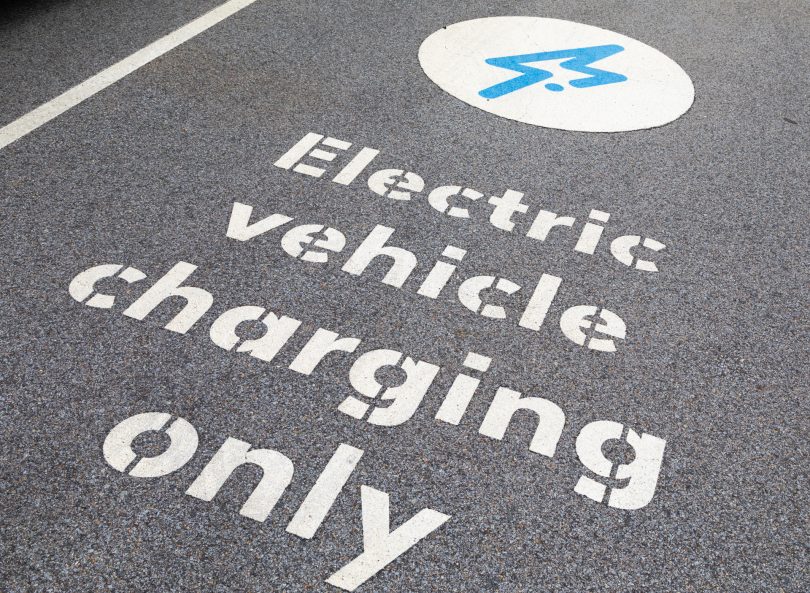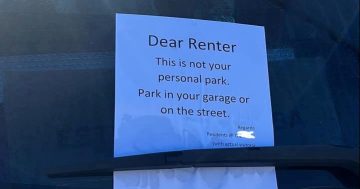
Parking issues are a common annoyance at multi-unit dwellings – so what can be done? Photo: File.
If you live in one of Canberra’s multi-unit dwellings and have never been on either side of a parking dispute, strata managers say you can count yourself lucky.
Strata managers deal with them on the daily, tackling problems ranging from residents parking in visitor parking to improper use of communal EV charging stations.
Civium Senior Strata Manager and Team Leader Monique Bosma says there’s no easy answer.
“The majority of units in strata complexes have one car space, which is an issue when the average household has two vehicles. Visitor parking in strata complexes can also be limited. I have seen examples of 80-unit complexes that only have four visitor parking spaces,” she said.
“People are purchasing into residential developments where there aren’t enough spaces for their vehicles, and parking – especially free, unrestricted parking – is not always readily available in the ACT.
“People often resort to parking on common property, verges or visitors parking.”
Parking allocations adhere to Territory Plan provisions at the time of development. Parking in addition to this is virtually unheard of, and it falls to owners’ corporations to work with their strata managers to manage the problems that arise from the deficit.
But what can actually be done to minimise disputes around this very finite resource?
Residents can include rules around visitor parking when establishing strata bylaws that govern the use of such shared spaces, but Monique suggests that the first port of call in the face of recurring breaches is education.
“Education is a massive piece. When we receive reports of residents parking where they shouldn’t, the first step is to send general reminders to ensure everyone is well-informed of the rules,” she said.
“We find more often than not this is enough, because a lot of the time in multi-unit dwellings, it’s a simple matter of new people moving in and not knowing the rules.
“In circumstances where breaches of the rules continue, we find that giving that person a call to talk through the issue has a better outcome than sending breach notices.”

Issues arise with appropriate EV charging station usage as well. Photo: Michelle Kroll.
In the rare occurrences when this still isn’t enough, the executive committee of residents must formally instruct strata managers to escalate the matter by issuing an infringement notice. This formal document gives the person in breach a specified timeframe to rectify the problem. If not, the owner’s corporation can take action to remove the vehicle.
These more extreme measures can cause friction among neighbours, but while Monique says it “rarely comes to that”, she has seen a fairly wide spectrum of parking infringement scenarios – and the power to enforce the rules can only go so far.
“All your strata manager can control is communication to residents and assist with the establishment of rules. We can’t control behaviour, the number of parking spaces at the building or street parking by the ACT Government,” she said.
“The worst scenario I have seen is when a resident parks their vehicle in another unit’s designated parking spot. That can have a negative cascading effect that promotes illegal parking because we now have someone who can’t even park in their own spot.
“Car spaces are private property so this becomes a civil matter. Our advice to the resident is to leave a note to let the owner of the vehicle know it’s private property.”
Add to this, in more recent times, a rise in communal electric vehicle charging spaces and the associated issues.
Civium General Manager, Facilities Management Alex Boundy says when a body corporate forgoes communal car park spaces for EV charging, they may encounter issues with non-electric vehicles using the spaces or EVs parking there for inappropriately extended periods.
Where there’s technology to circumvent this – such as electronic bollards that can sense a battery’s deficit and spring up when a car overstays its welcome – uptake is slow.
“The issues are common enough that the technology exists, but the installation of that tech is pretty rare. More often, we see the uptake of communal charging solutions falling down because of these issues,” he said.
“It’s just another hurdle that makes something that complicates something that should be straightforward. It’s another nuance of body corporate living in the ACT where the executive committees are relatively new, and there’s no black and white legislation to lean on.”
“I think in the long term, the hope is that the ACT moves towards more public infrastructure for fast charges.”
Monique says while strata managers will continue using the tools in their arsenal – education, communication and escalation where needed – residents can work with their strata managers to minimise the impacts of this part of community living.
“If you’re picking your battles, we advise consistency. It might not be an issue if people park in visitor spots, but be aware, it does set a precedent,” she said.
“Owner corporations should not be selective when it comes to enforcing the rules. Rules need to be followed by everyone and enforced, otherwise they’re redundant.”





















